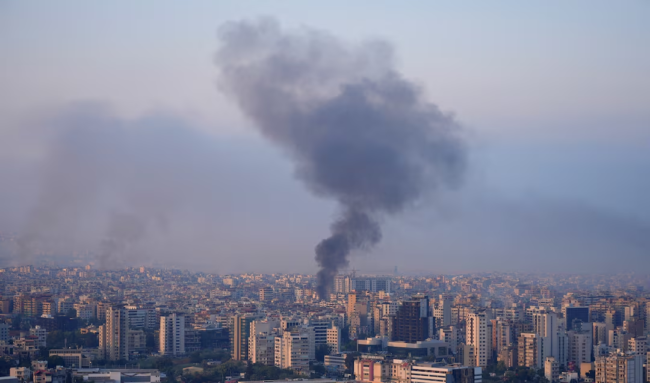
Smoke billows over Beirut’s southern suburbs, amid the ongoing hostilities between Hezbollah and Israeli forces, as seen from Sin El Fil, Lebanon October 6, 2024. REUTERS/Joseph Campbell
Consecutive Israeli Strikes Hit Southern Beirut Suburbs
Multiple Strikes Reported Over Beirut Suburbs
Beirut’s southern suburbs experienced sustained airstrikes from late Saturday into Sunday, according to eyewitnesses from Reuters. The attacks, lasting nearly 30 minutes, were visible across several kilometers, with flashes of red and white lighting up the sky. The strikes followed several days of bombing by Israel targeting areas in Beirut linked to Hezbollah, an Iran-backed armed group.
Targeting of Hezbollah Leadership
Israeli airstrikes reportedly killed Hezbollah’s leader, Sayyed Hassan Nasrallah, during an operation targeting the group’s central command headquarters in Beirut on September 27. Hezbollah has since confirmed Nasrallah’s death. Additionally, Hashem Safieddine, considered a potential successor to Nasrallah, has been unaccounted for since an Israeli airstrike near Beirut’s international airport on Friday. Lebanese security sources indicated that Safieddine’s whereabouts remain unknown.
The continued strikes in Dahiyeh, a Hezbollah stronghold south of central Beirut, have hindered rescue operations in the area following an earlier attack on Thursday night.
Potential Blow to Hezbollah and Iran
If Safieddine is confirmed dead, it would represent a significant loss to Hezbollah and its primary backer, Iran. Israel’s military actions in Lebanon have intensified in recent months, reportedly decimating large parts of Hezbollah’s leadership. Israeli military spokesperson Rear Admiral Daniel Hagari stated that Israeli ground operations in southern Lebanon have resulted in the elimination of 440 Hezbollah fighters and the destruction of over 2,000 Hezbollah targets. Hezbollah, however, has not released any official casualty figures.
Expansion of Israeli Operations in Lebanon
Israeli military actions have expanded beyond Hezbollah strongholds in Beirut. On Saturday, Israeli forces struck the northern Lebanese city of Tripoli for the first time. The strikes targeted a Palestinian refugee camp, reportedly killing a Hamas member, his wife, and two children. Palestinian media identified the deceased as Saeed Atallah, a leader of Hamas’s armed wing. Israel confirmed the killing of two Hamas members but did not specify their location.
Additionally, Israeli forces conducted ground operations in southern Lebanon, resulting in the deaths of nine Israeli soldiers. The intensified conflict has forced 1.2 million Lebanese citizens—nearly a quarter of the population—to flee their homes, according to Lebanese officials. Hundreds of civilians have also been killed in the Israeli strikes.
Cross-Border Rocket Fire and Lebanese Response
On Saturday, Hezbollah claimed responsibility for launching missiles at an Israeli military site near Haifa. The Israeli army confirmed that two projectiles had crossed into Israeli territory, with one being intercepted and the other landing without causing damage.
Anniversary of October 7 Attack by Hamas
The escalation in violence coincides with the anniversary of Hamas’s October 7, 2023, attack on southern Israel, which resulted in the deaths of 1,200 people and the abduction of approximately 250 hostages. In response to that attack, Israel launched an ongoing military operation in Gaza that has killed nearly 42,000 Palestinians, according to Gaza’s health ministry, and displaced most of Gaza’s population.
International Reactions and U.S. Involvement
The civilian impact of the conflict has sparked widespread international protests, with large-scale demonstrations in major cities over the weekend. Iran, a key supporter of both Hezbollah and Hamas, launched ballistic missile strikes on Israel earlier in the week, though these caused minimal damage.
In the United States, President Joe Biden has urged Israel to consider alternatives to striking Iranian oil infrastructure. U.S. officials, including General Michael “Eric” Kurilla, the top commander for the region, are currently conducting consultations with Israeli military leadership to assess potential courses of action.
COMMENTS